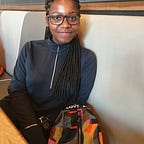Remember: Uyinene Mrwetyana
Tracy Chapman said that revolution sounds like a whisper. Perhaps that is why people do not hear the scream. Sometimes it feels as though it is tearing at my ear drums, the things I see with my eyes. That on Saturday I gloated that I went out into the street at daylight and not when the sun had gone so that people could not steal me, because people, like objects, get stolen: picked up like rocks from where they are standing, and we are left only with the shadows, pointing at that dark spot on the road, saying ‘she was last seen…’
This week the only physical iteration of Uyinene are the posters that render her missing. I stare at her, plastered on the back of the bus driver's seat: the way the sun shines in Cape Town it caresses even the falsest cheek on gloss paper, or maybe it is because I am trying to imagine that she is still real. I've always found it abnormal, looking at the pictures of people who are gone, because I felt fooled: here you are, when actually you are not. But Uyinene's story becomes unsettling for more sinister reasons.
Uyinene was a University of Cape Town student who lived in Roscommon residence in Claremont. On August 24th, she went to collect a parcel at the Post Office. There, she was ‘bludgened with a scale’ (according to The Times), raped, and murdered. The accused, Luyanda Botha, appeared in Wynberg municipal court.
According to the United Nations, an estimated 35% of women have experienced sexual assault of some nature at some point in their lives, but they don’t hestitate to note that some estimates show that this number could be as high at 70%. In South Africa, the number of rapes has climbed in the 2017–2018 period,reaching 50 000 rapes per year. Lisa Vetten notes the existence of two conflicting stories: one painted by President Cyril Ramaphosa of a country at war with it’s women, and one painted by police statistic which, compared to previous trends, seem to show a sexual violence brought under control, but despite this, 85% of women who are coerced into unwanted sex by their partners do not report the incidence.
Whilst I’m aware that rape affects both men and women, I’m going to speak about women today. I think we need to consider the social conditions that still enable individuals to commit such acts. My public health textbook, written by David Coetzee, points to the establishment of a strong gender hierarchy, as well as definitions of physical strength laying in acts of violence (and most often being the definitions that define manhood) being the key factors that led to the subordination of and violence against women, culminating in a culture of violence and abuse. As I read this I can see Nabiha Ebrahim’s eyes flashing to me, saying
‘The “mother city”. It’s interesting to me that Cape Town is affiliated with a mother. a mother, a woman. her mountain stands tall, acting as her armour against the cruelty at the hands of men. but these men are fighting back and they’re winning through their brutality…’
Perhaps this is the reason why I asked myself why I was numb, not paralysed by the fear of my environment, until I remember that I have dodged the outside runs for the treadmill, the late night study-snacks walks for what was in my fridge, for walks back home from campus for the bus, because it has always been normal for me to take precautions inspired by my fears. And I’m not alone: all women carry with them lists of all the things that they should not do, and we’ve normalised it to the point where the first thing we ask when we hear that a women has been assaulted in some or another manner is under what circumstances she was assaulted, because it is not the assault that matters, it is that we keep telling women to add more things to their lists of things they shouldn’t do.
But we’ve run out of paper. Our pockets are getting heavy.
Author Toni Morison dreamt of characters that remembered pain until they met characters who understood the pain so well, that other characters didn't have to explain what was already known, and so the throbbing of pain in one’s chest could rest. South Africa seems to be one of those characters that does not know a woman's pain and so we still find ourselves explaining. In public health, they say that trauma is a disease, and perhaps that is exactly what Gender Based Violence (GBV) is: it is the deprivation of essential elements too long, the application of physical force too quickly, and the sustained distortion of the self too habitually.
Tracy chapman said that revolution sounds like a whisper, so perhaps that is why they do not hear the scream. If I could sing, I would sing back to her: screams can turn into whispers, air can run out of lungs, voices can get tired, voice boxes can go hoarse with anger, and so the scream can he dulled to a whisper.
Rest in peace, Rest in power, Uyinene.
